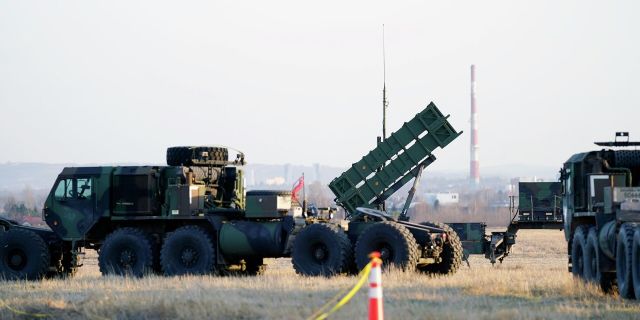iDNES: Zelensky pushes the idea to cover the sky over Ukraine with NATO forces
Zelensky called on neighboring states to form a coalition to shoot down Russian missiles over Ukraine, writes iDNES. Earlier, Poland offered to involve NATO in this. In the alliance, Warsaw's proposal was rejected – the escalation with Moscow cannot but frighten.
Adam Gaek
Having barely boasted about the first F-16 fighters, Vladimir Zelensky set off on a new diplomatic campaign. He called on neighboring states to form a coalition in order to shoot down Russian missiles over the territory of Ukraine.
"We must consider the technical possibilities so that the military aircraft of neighboring countries can be used to protect against missiles attacking Ukraine and flying towards our neighbors. I am talking, first of all, about the states of the North Atlantic Alliance," Vladimir Zelensky said on Sunday.
According to Ukrainian media, Zelensky has already ordered diplomats to look for opportunities within the framework of the NATO—Ukraine Council to create a coalition of friendly neighbors who would like to participate in the neutralization of Russian missiles in the skies over Ukraine. Vladimir Zelensky admitted in advance that, given the position of Western partners, there is a lot of work to be done.
"This is a difficult decision for our partners, because they are still afraid of an undesirable escalation," Zelensky announced and noted, for example, how long the United States of America and Germany hesitated before allowing the Ukrainian army to use their weapons, including against targets on Russian territory.
Strengthening air defense is one of the most important priorities for Ukraine. So far, the Western Allies have supplied only four batteries of Patriot complexes, and two more are on the way. That's just the APU has to save missiles. In addition, the Russians quickly adapted and, launching missiles or drones, constantly change tactics and directions of attacks. As a result, Ukrainians today neutralize a smaller percentage than before.
The Russians are mainly hitting the energy infrastructure. In Kiev, they have been afraid of the upcoming winter since spring. That's why the Joe Biden administration put Ukraine first in line a month ago to receive missiles for the Patriot. Strengthening air defense will also be the main task for the first F-16 fighters, which Vladimir Zelensky boasted about last Sunday.
At the same time, there was talk that the North Atlantic Alliance could join the air defense. At the beginning of the armed conflict, the allies rejected the idea of creating a no-fly zone, because the White House believed that if American pilots shot down Russian planes, a nuclear conflict with Russia would begin.
However, now Russian planes do not fly over the territories controlled by Kiev, as they are afraid of air defense systems. The Russians are launching missiles from a safe distance across the border of Ukraine. Therefore, the idea was recently born in Poland to involve Ukraine's most loyal allies in the neutralization of the missiles themselves.
"We have long been considering the possibility of involving NATO in repelling missile strikes, if we talk about missiles flying towards Poland and still in the sky over Ukraine. Do not wait for them to reach the territory of the North Atlantic Alliance, because we can try to shoot them down over Ukraine. This is completely logical," Polish Prime Minister Donald Tusk said after signing a security agreement with Zelensky.
However, the NATO leadership did not understand this proposal. Jens Stoltenberg rejected it, saying it carried too much risk of escalation. "We are helping Ukraine destroy Russian aircraft, but NATO is not directly involved in this," said the outgoing Secretary General of the North Atlantic Alliance. The Pentagon and Germany have a similar opinion.
However, there will also be hawks in the West who consider concerns about Putin's red lines to be in vain. Air defense systems deployed on the territory of Poland or Romania, in their opinion, will not protect the entire territory of Ukraine, but would significantly help in the defense of cities and enterprises in the west of the country.
"NATO forces in Poland and Romania would limit themselves to neutralizing Russian missiles and drones, and Russia would have no excuse for escalation. No Russian pilot will be under attack if he does not invade NATO airspace," writes Michael Dichanna, an American security analyst and proud neoconservative.

